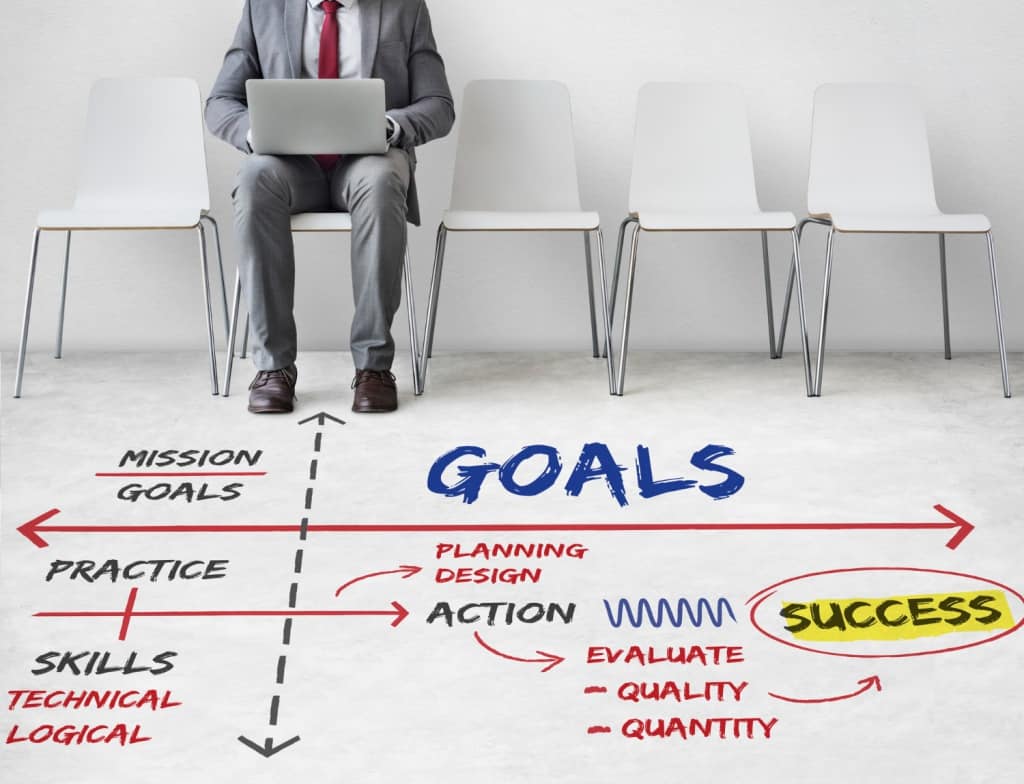If you're struggling with how to proceed with your job, career, and future, rest assured that you're not the only one. Many people are in the same situation, and one of the common reasons for this is a lack of clearly defined work goals.
Therefore, this article will provide work goals examples for evaluation and help you to define your own goals. These goals are not far-fetched but are specific and achievable enough to lead you in the right direction.
Table of Contents
- What Does "Work Goals" Mean?
- Why Are Work Goals Important?
- 5 Steps To Create Your Work Goals
- Work Goals Examples For Evaluation
- Key Takeaways
Tips for Better Engagement

Start in seconds.
Get free templates for your next interactive presentation. Sign up for free and take what you want from the template library!
🚀 Get templates for free

What Does "Work Goals" Mean?
The term "work goals" refers to specific goals or targets that a person sets for themselves to achieve in their professional life.
If you're looking to set work goals, remember that they should:
- Align with your career aspirations;
- Motivate you to achieve the desired results;
- Both short-term and long-term goals are available;
- Include many different aspects of your professional life, such as job performance, professional development, and career advancement;
- Relate to your personal growth, such as acquiring new skills or qualifications.
Whatever your work goals are, they should be specific, measurable, achievable, relevant, and time-bound (SMART) to be effective in guiding you toward successful outcomes.

Why Are Work Goals Important?
Work goals are so important for several reasons. Because they help you:
To stay focused
Humans are easily distracted, so setting goals serves as a reminder of what has to be done and what will get them back on track.
Setting work goals helps you to stay focused on what you want to achieve in your professional life. This focus allows you to prioritize your efforts, time, and resources toward accomplishing your objectives.
To keep motivation
Once you have set a goal, you will motivate yourself to achieve it.
When you successfully achieve your goals, you will have a sense of accomplishment, leading to increased job satisfaction and productivity. On the contrary, if you allow yourself to be lazy and fail to achieve your goals, you may experience feelings of guilt and accountability.
Furthermore, when setting personally significant goals, you will need to hold yourself accountable as you are the one who will be directly affected by them. This creates both pressure and motivation for you to take action and work towards achieving your goals.
To clarify about a career path
Setting work goals can help you clarify your long-term career aspirations and identify the steps to achieve them. In addition, these goals help you identify areas where you gain new skills or knowledge to advance your career.
It can be said that understanding work goals can help you make better decisions about employment opportunities, training and development opportunities, and other career-related decisions.
To measure the progress
Work goals allow you to measure your progress toward your objectives. You can see how far you have come and make any necessary adjustments needed.
For example, you set a goal of learning a new programming language in six months. By measuring progress, such as hours spent studying per week or completed coding projects, you can determine if you are making progress. If you are falling behind schedule, you may need to adjust your study habits, seek additional resources, or seek help from a mentor to achieve your goals.

5 Steps To Create Your Work Goals
Before setting up your work goals, it's crucial to answer the following questions to ensure that your goals are well-defined:
- What do I want to achieve in my professional life? Why do I need to achieve them?
- How does this goal align with my values and beliefs?
- What are my strengths and weaknesses that might impact achieving this goal?
- How much time and effort am I willing to commit to achieving this goal?
- Are there any potential obstacles or challenges that I may encounter, and how can I overcome them?
- Who can support and hold me accountable for achieving this goal?
By honestly answering these questions, you will be ready to develop realistic and meaningful work goals that align with your values, skills, and career aspirations.
Here are 5 steps to help you create your work goals:
#1 - Define your priorities
It's important to have a clear idea of your priorities. Consider what you want to achieve in your career, what skills you want to develop, and what projects or initiatives are most important to you.
Write down your top priorities to use as a guide when setting your goals.
#2 - Make your goals SMART
SMART - Specific, Measurable, Achievable, Relevant, and Time-bound. This framework can assist you in setting goals that are clear, realistic, and achievable.
When setting your goals, make sure they meet each of these criteria.
- For example, a SMART goal might be to increase your sales by 10% within the next six months.
#3 - Break down your goals into smaller goals
Once you have your SMART goal, break it down into smaller steps or milestones, which can be categorized as long-term and short-term goals.
By doing so, the goal becomes more manageable, and it's easier to track your progress along the way.
- For example, if your long-term goal is to increase your sales by 10% within the next six months, you might set a short-term of increasing your sales by 2% each month.
Breaking down the goal into smaller steps makes it more achievable and enables you to focus on each milestone before moving on to the next.
#4 - Create an action plan
It's time to create a plan of action. Create a detailed plan that outlines
- The steps you'll take to reach your goals
- Any resources or support you'll need along the way
- Any potential roadblocks or challenges you may face
- Deadlines for specific tasks
#5 - Evaluate and adjust
Finally, it is critical to evaluate your progress regularly and make any required changes to your goals or action plan.
This can help you in staying on track toward your goals. Don't forget to be open to feedback from your colleagues or mentors, and be willing to change your strategy if needed to achieve your goals.

Work Goals Examples For Evaluation
Here are some work goals examples for evaluation to help you better understand how to create your own goals:
Improve time management skills - Work Goals Examples For Evaluation
Long-term goal: Improve time management skills to increase productivity consistently over time.
Short-term goals:
- Identify time-wasters and eliminate them from daily routine.
- Set clear priorities and create a to-do list at the beginning of each day.
- Practice the Pomodoro Technique or other time management strategies.
Improve public speaking skills - Work Goals Examples For Evaluation
Long-term goal: Improve public speaking skills in the next year
Short-term goals:
- Attend a public speaking workshop or course within the next month.
- Learn how to use body language effectively and engage with the audience.
- Practice public speaking regularly by presenting in team meetings

Improve the work-life balance - Work Goals Examples For Evaluation
Long-term goal: Improve work-life balance by setting boundaries and managing time effectively.
Short-term goals:
- Set clear boundaries between work and personal life like no calls for work on the weekend.
- Prioritize self-care activities like exercise, hobbies, or spending time with family and friends.
- Create a schedule for rest and downtime outside of work hours.
Improve networking skills - Work Goals Examples For Evaluation
Long-term goal: Develop strong networking skills to build and maintain professional relationships.
Short-term goals:
- Attend at least one networking event or conference within the next month to meet new people.
- Network within the company by joining social events or volunteering for cross-functional projects.
- Build relationships with colleagues in different teams.
- Learn how to be more social, and practice every day.
Project management skills - Work Goals Examples For Evaluation
Long-term goal: Develop strong project management skills to lead successful projects, and advance in my career as a project manager.
Short-term goals:
- Enrol in a project management course or certification program within the next three months.
- Seek feedback from colleagues or mentors to identify areas for improvement.
- Take on more challenging projects and roles within the organization to continue building project management expertise.

Key Takeaways
Setting work goals is crucial for anyone who wants to develop in their career. It provides direction and allows you to prioritize your efforts, time, and resources toward achieving your goals. Hopefully, by following the steps mentioned, you can create your own goals successfully.
And to help you develop your professional life and enhance essential skills, including public speaking. AhaSlides offers a wide range of templates and features to create engaging presentations while receiving immediate feedback that can assist individuals and teams in improving their performance.








